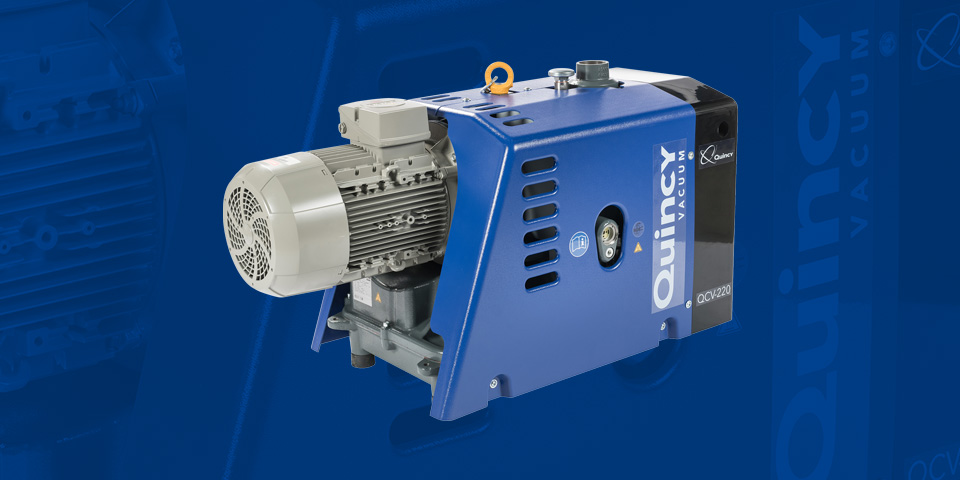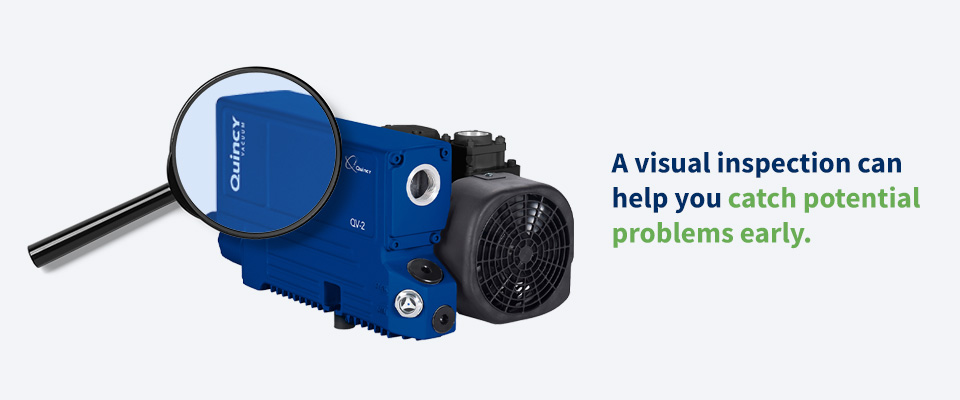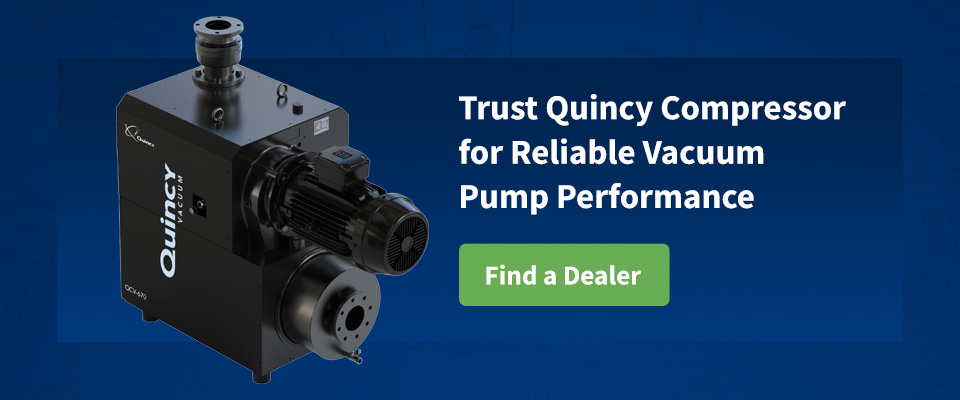
Vacuum pumps are vital in creating low-pressure environments for various industries, from manufacturing to food and beverage. Proper vacuum pump maintenance is key to ensuring your equipment operates effectively. Regardless of the type of vacuum pump or its uses, each requires proper care and attention to run smoothly.
10 Tips for Vacuum Pump Maintenance
Regular preventive maintenance for vacuum pumps can help them last longer and perform better while combatting costly repairs and unplanned operational downtime. Scheduling routine inspections and promptly addressing repair needs will save you valuable effort, time and money in the long run.
1. Check and Change Oil Regularly
Regular oil checks and changes are necessary because the oil in a vacuum pump lubricates moving parts. The oil also helps maintain a proper seal within the system. Degraded or dirty oil might increase wear and tear, leading to potential pump failure.
To check the oil, follow these quick steps:
- Check the sight glass provided with the pump.
- If the oil appears dark or cloudy, it’s time to change it.
- Drain the old oil and clean the reservoir if necessary.
- Refill with the manufacturer-recommended oil.
2. Monitor Operating Temperature
An overheated industrial vacuum pump can indicate underlying issues, such as poor ventilation, excessive workload or failing components. If the pump continuously operates at elevated temperatures, it can degrade the oil, damage internal parts and cause the pump to shut down unexpectedly.
Use an infrared thermometer to measure the pump’s operating temperature. Some pumps even have temperature readings available on a local HMI. Compare the readings with the manufacturer’s recommended operating range. If the temperature is too high, see whether there’s enough ventilation or if the cooling system requires service.
3. Clean or Replace Filters
Filters prevent contaminants from entering the vacuum pump. Dirty or clogged filters can restrict airflow, impacting the pump’s performance and causing overheating.
Ensure you regularly inspect and clean the filters according to the manufacturer’s guidelines. Replace them if they show signs of wear or blockages. Remove the filter housing, take out the filter and either clean or replace it with a new one.
4. Verify Pump Speed and Performance
Monitoring the pump speed and performance helps detect early signs of wear or potential failure. Use a Piccolo to measure the pump’s flowrate and compare it to the manufacturer’s specifications. Regularly check the pump’s vacuum level with a vacuum gauge. Investigate and correct any deviations from the norm.
5. Tighten or Replace Parts
Over time, vibrations and regular use can cause bolts and other parts to loosen, leading to potential leaks or mechanical failures. As a result, you may face costly vacuum pump repair services.
Periodically inspect all accessible bolts, screws and connections. Tighten unsecured parts and replace any components that show signs of wear or damage. This routine check helps prevent unexpected breakdowns.
6. Monitor and Maintain Proper Fluid Levels
Some vacuum pumps use fluids other than oil, such as coolant. These pumps require adequate fluid levels to improve their longevity and operation. Use a gauge or sight glasses to check your vacuum pump’s fluid levels.
Top off any low fluids, following the manufacturer’s recommendations for the type and amount of fluid to use.
7. Conduct a Visual Inspection
A visual inspection can help you catch potential problems early. Be sure to inspect the entire pump and its components regularly. Look for any signs of vacuum leaks in the pump, compromises to the housing, worn belts or any other visible damage. Address any issues immediately to prevent further wear.
8. Listen for Unusual Noises
In addition to visual checks, listen closely for any unusual noises during operation. Strange sounds are often early indicators of mechanical issues, like worn bearings, loose parts or internal damage.
Grinding, knocking or excessive vibration are all signs your vacuum pump requires inspection. If you hear something unusual, shut down the pump and address these potential issues before resuming operation.
9. Keep It Clean
Cleanliness matters. A clean vacuum — inside and out — can prevent dust and debris from entering the system. Dirt buildup may damage the pump or its efficiency.
Regularly clean the pump’s exterior with a dry cloth. Ensure the surrounding area is free of dust and debris. For more thorough cleaning, follow the manufacturer’s instructions to safely clean internal components.
10. Inspect the Surrounding Environment
The vacuum pump’s environment can impact its performance and life span. Poor environmental conditions may contribute to issues such as overheating or contamination.
Keep your pump in a well-ventilated area, away from excessive heat or cold. Check for any environmental factors that could introduce contaminants, such as dust or moisture. Adjust the pump’s location or surroundings to maintain optimal operating conditions.
Vacuum Pump Preventive Maintenance Schedule
In addition to the preventive maintenance tips, you must follow a schedule. A routine ensures you stay up to date with your vacuum pump maintenance needs. Feel free to adjust the following guide to your vacuum pump’s requirements.
You can perform the following tasks daily:
- Conduct visual inspections for leaks, damage or abnormal wear.
- Check oil level and condition.
- Monitor operating temperature.
- Listen for unusual noises.
Complete these tasks on a weekly or monthly basis:
- Check or replace filters.
- Verify pump speed and performance.
- Tighten or replace parts if necessary.
The following maintenance tasks only require biannual or annual attention:
- Change the oil.
- Monitor and maintain proper fluid levels.
- Inspect and deep clean the surrounding environment.
- Clean the pump’s exterior and examine its overall condition.
Common Questions About Vacuum Pump Maintenance
Explore the following questions and answers about keeping your vacuum pump in top condition.
How Do I Protect My Vacuum Pump From Moisture?
Use a gas ballast to expel water vapor, install a moisture filter and keep the pump in a dry, ventilated area. In moisture-based applications, consider purging the pump with air, isolated from the process, for 5-10 minutes prior to shutdown.
How Long Do Vacuum Pumps Last?
Vacuum pumps can last several years with proper maintenance. Regular upkeep and timely repairs are essential to extend their life span.
How Often Should the Oil Inside a Vacuum Pump Be Changed?
The frequency depends on the type of pump and the severity of the application. As a general rule, pumps using lubricating oil in the compression chamber may require oil changes every three to six months, while pumps using oil to lubricate synchronizing gears may last longer. Always check the manufacturer’s requirements for optimized timelines.
Can I Perform Vacuum Pump Maintenance Myself?
While you can perform basic maintenance tasks like visual inspections and filter cleaning, more complex maintenance may require professional expertise. For instance, replacing parts or troubleshooting mechanical issues is best left to the experts.
Choose a trusted service provider with a history of delivering top-quality repair and maintenance solutions.
Trust Quincy Compressor for Reliable Vacuum Pump Performance
With this guide, you can ensure your vacuum pumps operate smoothly for years. Remember, each pump type has unique maintenance needs, from oil changes and vane replacements to membrane inspections and fluid level checks.
For all your vacuum pump needs, trust Quincy Compressor as your go-to air compressor and products manufacturer — backed by over a century of industry expertise. We offer reliable, durable vacuum pump units and expert customer support. Our products offer uncompromising performance to help you tackle any job that requires an air compressor, no matter your industry.
Browse our products today to find the perfect option for your work. For more information, find a sales and service representative in your area.



